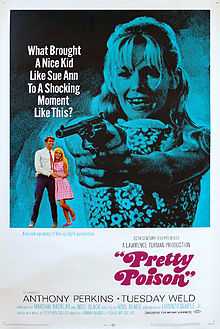Pretty Poison (film)
| Pretty Poison | |
|---|---|
 original film poster | |
| Directed by | Noel Black |
| Produced by |
Lawrence Turman Marshal Backlar Noel Black |
| Written by | Lorenzo Semple Jr. |
| Based on |
Novel: Stephen Geller |
| Starring |
Anthony Perkins Tuesday Weld Beverly Garland John Randolph Dick O'Neill |
| Music by | Johnny Mandel |
| Cinematography | David Quaid |
| Editing by | William Ziegler |
| Distributed by | 20th Century Fox |
| Release dates | 23 October 1968 (US) |
| Running time | 89 minutes |
| Country | United States |
| Language | English |
| Budget | US$ 1,800,000 |
Pretty Poison (1968) is a psychological thriller directed by Noel Black, starring Anthony Perkins and Tuesday Weld, about an ex-convict and high school cheerleader who commit a series of crimes.
While not generally considered an example of neo-noir, the film does include certain elements of the genre, including a femme fatale, a character trapped into circumstances beyond his control, criminal protagonists and, of course, murder.
The film was based on the novel She Let Him Continue by Stephen Geller; this was also the working title of the film.
There was a 1996 TV movie remake with the same title and plot.
Plot
Dennis Pitt is a disturbed young man on parole from a mental institution who becomes attracted to teenager Sue Ann Stepenek. He tells her that he is a secret agent, and takes her along on a series of "missions" that eventually end in murder. While Dennis is racked with guilt over both what he has done and what he has allowed to happen, Sue Ann is excited by the "adventure" and entreats Dennis to run away with her to Mexico. First, however, they have to get rid of her disapproving mother.
Dennis knows that the police will take Sue Ann's word over his, so he takes the blame for their crimes. Sue Ann, meanwhile, betrays him without a second thought, sending him to prison for life. Dennis is more than happy to be locked up, as it keeps him away from Sue Ann, of whom he is now quite frightened. While Dennis refuses to tell his skeptical parole officer Azenauer the truth, he asks him to "see what Sue Ann is up to" in hopes she will be exposed for what she really is. The film ends with Sue Ann meeting a young man and lamenting to him that the people who took her in after her mother's death won't let her stay out late; it is implied that she will use and destroy him just as she did Dennis. But Dennis' parole officer is indeed watching as she departs with her latest victim.
Awards and honors
- 1968 New York Film Critics Circle Award, Best Screenplay - Lorenzo Semple Jr.
External links
| |||||